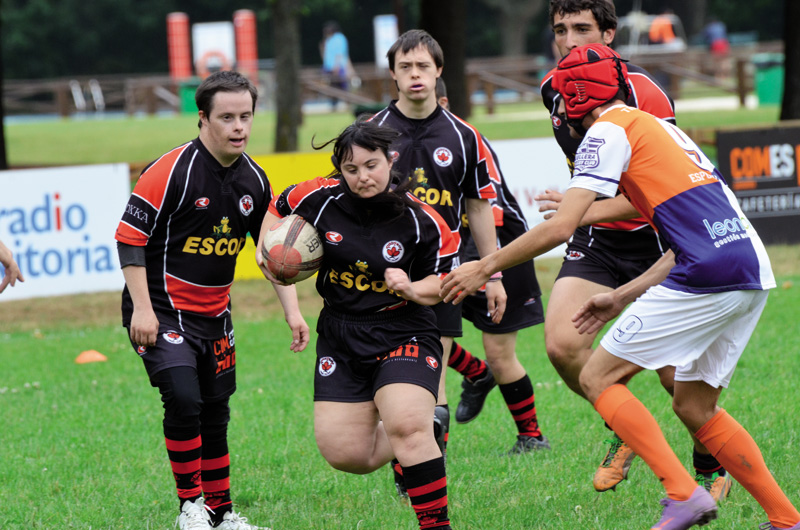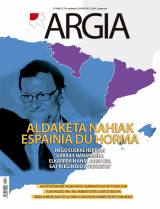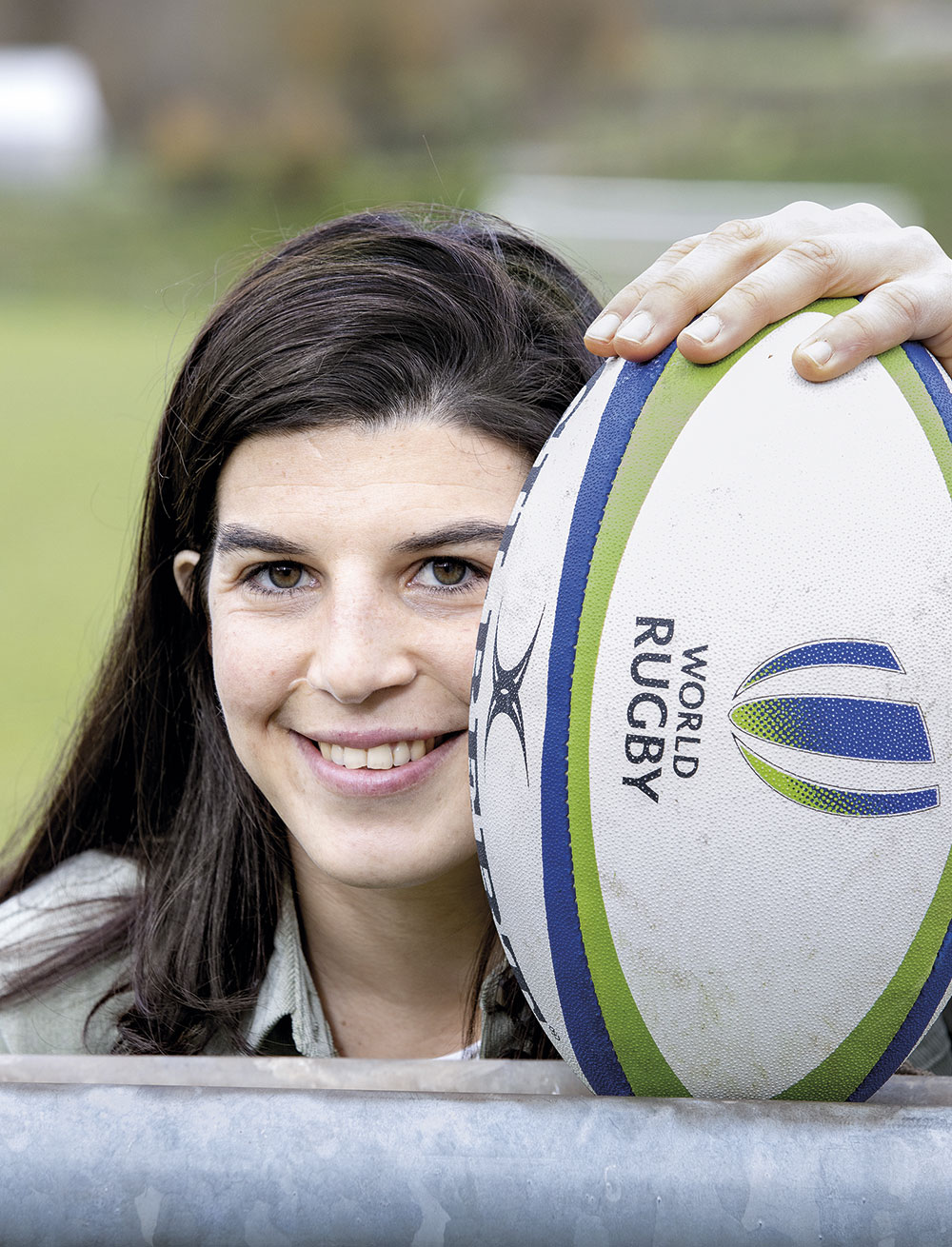Forwards, but broader intervention
- The Gaztedi team in Vitoria-Gasteiz received the prize in the 1st edition of the World Cup of Inclusive Rugby. In the championship. Based on the experience of the Alaveses, we have talked with Mikel Epalza, rugby, Eneko's mother, with autism, Aintzane Muguruza, and the member of the Guipuzkoan Federation of Adapted Sport, Jurgi Olasagasti, about the role that sport can play in integrating people with intellectual disabilities into society.

You're clear about it at the club in Vitoria-Gasteiz. The inclusion is not that people with special needs, be autistic with down syndrome, meet in special groups and play games against each other. If a project wants to be fully inclusive, it must include all the classes of the club: athletes, coaches, managers... That's what they're doing in Gaztedi. Teams with special needs train every Saturday with other players and can demonstrate what they have learned in real matches, including the rugby team, with or without disabilities, mixed on the same team. Last year, for example, they returned from England with a precious treasure.
France, Scotland, Ireland, Wales, Italy, Serbia and Argentina participated alongside Gaztedi in the World Inclusive Rugby held in the city of Bradford. In the championship. Two awards were distributed: the one won by the Irish Sunday’s Well Rebels for being the best, and the one received by Gaztedi for his exemplary inclusion work, the Spirit of Mixed Ability Rugby Trophy.
Mikel Epalza:
“In rugby teams we get together the weirdest people and feel fully integrated. Training and playing along with Down syndrome and autistic has
been one more step.”
“Winning the World Cup has been wonderful for all the people who are part of the Down Araba partnership and play on our team,” said Mikel Epalza, from the federated team of Escor-Gaztedi. “Suddenly we have become a benchmark. However nice the responsibility is, it will require more effort, we will have to influence more people so that the project grows.”
Specifically, Donostia Aintzane Muguruza, Eneko's mother, a 10-year-old autistic child, is looking for a reference. He told us that his son “loves” playing football with his friends, and when he heard on the radio that the Levante had an integrative project, last March he sent a message via Twitter to the Real Sociedad, asking him if he has or wants to organize it. It received no response – professional Basque football teams do not have integrated sport plans – but it continues to insist, aware that sport can be an effective inclusion tool. “In football, the child enjoys a great deal, but the difficulties cast him back; the frustration is violent then or at the same time strengthened. That's why so many people like him get into the house. My intention is that this should not happen.” He explains that a friend with the same concern sent a letter to the Gipuzkoan Football Federation and that they replied that these are issues that must be channelled through the Diputación. “But my desire is not to access social services,” says Muguruza. “The association of autism Gautena and others are doing a great job, but I want to go one step further. It’s about opening people with special needs to society, and to do so you need to mix them all together so that people with disabilities feel truly interiorized and the rest can get to know this reality.” Epalza and Muguruza agree on the way to understand inclusion.
“Integration benefits us all,” says Jurgi Olasagasti, a technician at the Guipuzkoan Federation of Adapted Sport. “Practicing sport for people with disabilities is positive, insofar as it entails physical, psychological and social benefits; for others, for whom we do not realize that many times those around us are part of society, closer relationships help us to see life differently, to relativize the preferences and problems of each one”.
If you can get it in rugby…
Regarding Gaztedi's trajectory, Epalza explained that the principles of incorporation have marked from the beginning the direction of the club, focusing on the values of this sport, especially on an amateur level: “In rugby teams we get together the weirdest people and feel fully integrated. Training and playing along with Down syndrome and autistic has been one more step. Gaztedin has been found by patriots and military, people from left and right, black, Moroccan and white, civil guards and their children… and there has never been any problem. Respect is a basic value in all classes of the club, at least in the field.”
Aintzane Muguruza:
“It’s about opening people with special needs to society, and to do so you need to mix them all together so that people with disabilities feel truly interiorized and the rest can get to know this reality.”
The inclusive team began the reanimated 2012 by David Izquierdo, a player of the Escor-Gaztedi and an educator of the association Down Araba-Isabel Orbe, until he became world champion in a short time. “Our destiny is not that,” says Epalza. “We will continue to work to show that if inclusion can be achieved in rugby it is also possible in other areas, whether on the street, in bars or anywhere else. Socialization is fundamental.”
“If you keep young people like Eneko in closed free time groups, even though they are applauded projects, they will lose the opportunity to interact with society,” Muguruza explains. Their son loves to play football with his friends, and they also like to play with Eneko. What happens is that they can sign up in extra-school groups, but Eneko can't. “I want to show that there are difficulties in socializing these boys and girls. That’s justice, giving everyone what they need.”
Competition vs participation
In the same line Olasagasti says: “Everyone should have the opportunity for inclusion. Another thing is that, as sport is organised, there are many things to do ahead, because today competition in general has more than participation. Clubs or associations should bear in mind that there are other ways that are not competing.” The technician of the Gipuzkoan Federation is also clear that inclusiveness is “very nice” if all the involved individuals are sufficiently aware, as the environment is sometimes violent. “We know what barbarities anyone who plays football has to listen to; so think about what young people with disabilities can suffer...”
Faced with the question of whether educators and coaches are willing to properly attend to people with special needs, Muguruza has generally answered no, returning to the question of competence: “It’s normal that if you haven’t received training and never worked with people like Eneko… In addition, if the goal is to be the most competitive, it’s hard for us to move forward. Precisely, the Guipuzkoan Football Federation has responded to us that the objective is competitions and that we must focus it on the line of social action of any other Member outside them. It's not about that." She is aware that at first it can be difficult, because her child has limitations to express her feelings and is often pessimistic about new things. There are, however, guidelines that, well-elaborated, allow us to get things that are beneficial to everyone. Muguruza is convinced that in the long term the benefits would be for everyone. With a smile on the lips, Eneko tells us he knows the rules of football, but sometimes, when he is winning, he wants his opponent to get the draw and maybe he gets the goal in the goal. Or that he will decide to go to the other team without telling anyone anything, or that he escapes because the party doesn’t like it…“.
The emphasis on education
Jurgi Olasagasti, of the Federation of Adapted Sport, has praised the effort that many agents are making, but he does not believe that in general the trainers are prepared, because we are not actually willing to understand sport in any other way. Especially in collective sports, insofar as the objective is to win, insofar as the performance of a player affects the whole team, if the disabled player does not internalize strategies or stumbles into their defense, it will become an obstacle.
“Are we willing to take care of less skilled children?” he asks in the air from Olasagasti. “Anyway, I want to make one thing clear: I don’t want to detract from the championship’s importance,” he says. Striking a balance between competition and participation, one of the keys, not only in the integration of athletes with intellectual disabilities, but in a broader sense, to the extent that the dominant model has set a structure to its own measure, often leaving aside those who do not adapt.
Jurgi Olasagasti:
“Why do young people stop practicing sport? Because they don't like to do sports? Or is the current competitive model the one you don't like?
Perhaps if we bet more on the path of participative games…”
To strengthen the participation path, Olasagasti argues that a greater effort should be made in “education”, that it is necessary to restructure the sport trajectory from school and strengthen relationships with clubs, among other things. “Why do young people stop practicing sport? Because they don't like to do sports? Or is the current model the one that doesn't like? Perhaps, if we were more committed to the path of participatory games… Paying more attention to the benefits inherent in physical activity would benefit us in the future.”
In this sense, as a parenthesis, the experts who address the reality of female athletes comment that the federative model does not adapt well and that many girls have travelled the way in the line of a sport that guarantees greater participation. “As a young man, we often hear that girls don’t like to play sports. What happens is that perhaps what he does not like is the style that there are in concrete structures, or the treatment that they receive,” said Ainhoa Azurmendi, an expert in equality issues and a federated handball player until 2012, in the interview we did at number 2571 of ARGIA.
“Money cannot be an excuse,” Muguruza continued. “These people, with increasing autonomy, will do more for themselves, without ever having to be in someone’s custody, thus enabling costs to be reduced. And sport is a good tool for the development of autonomy. That is true, the cost will be reduced in the long term, at first we have to make investments.”
Intervention by parents and associations, key
In taking the first steps, the work of Down Araba and associations such as this, as well as the involvement of parents, as Mikel Epalza of the Gaztedi group has told us. His experience has set us as an example: “At first they are a little scared because they think rugby is dangerous, but when they see that young people do very well and that it is not as strong a sport as they think, they feel satisfied with the project. You've often heard that kids can't do this or the other, and seeing how they play in rugby is a nice thing."
Olasagasti considers it important to make the adapted sport known, organize activities and create benchmarks that increase interest and attract more people. The Federation has about 400 licences, all non-sportsmen and women. “It’s a small amount, as statistics indicate that 8% of the population suffers from disability, many of them don’t realize the things they would be able to do.” In this regard, he told us that the media have something to do, because in addition to the swimmer Richard Oribe there are more athletes who deserve to make their achievements known. And with regard to visibility, it's made a scale. “There are male athletes, women later, men with disabilities and, ultimately, women with disabilities. Think about the reality of the latter.”
“We started four years ago and we are already world champions,” concludes Mikel Epalza, from the Gaztedi rugby team: “I don’t want to be arrogant, but now we are the referents, and we don’t have any putas of ideas. We're sure to get it wrong every day, every Saturday workout, but let's go ahead. The road is done with effort.”
Gaztedi errugbi taldeak iaz lortutako balentria akuilu, Gasteizek jasoko du datorren urtean Munduko Errugbi Inklusiboko Txapelketa. Hamabost bat talde bilduko dira bertan eta, nork daki, agian izango da beste klub euskaldunik ere, integrazioaren bidean pauso politak ematen ari den Hernani adibidez, edo Bilboko Universitario XV. Eneko ume autistak Hernaniren proiektua ezagutzeko abagunea izan zuen igande batez, eta Federazioaren barruko multikirol egokituan ere aritu da. Bien bitartean, harremanak sendotzen jarraitzen du haren ama Aintzanek. Esan digu Realari txioa bidali zionetik hainbat gurasok hots egin diotela jada, eta ekimen integratzaile gehiagoren berri heldu zaiola, mistoak eta ez. Familiei dei egin die ahalik eta ate gehien jotzeko, izan Down Araba, Gautena, Nafarroako ANA edo Bizkaiko Gorabide elkarteena, izan kirol egokituko federazioena eta haien parte diren taldeena, helburu izanik seme-alabek bizi duten errealitatea azaleratu eta gizarteratzeko aukerak esploratzea. Kirol mundura hurbiltzeko hamaika era daude gainera. Esaterako, aurten, adimen urritasuna duten pertsonak laguntzea xede duen Beasaingo Txolarte elkarteko kideek, Ehunmilak mendi lasterketaren antolakuntzan lagunduko dute, uztailaren 8tik 10era bitartean. Aipatu genitzake ere bai, dozena erdi adibide gehiago jartzearren, Kirol Egokituaren Euskal Federazioa 2013an antolatzen hasi zen areto futboleko euskal liga, kirol eta kultur jarduerak uztartzen dituen Angeluko Autrem’handi elkartearen jaialdia, ANA padel txapelketak, aulki gurpilduneko saskibaloia eta pilota egokitua, ezgaitasuna duen kirolaria ingurune naturalean integratzeko urrats handiak eman dituen kirola.
Euskaltzaindiak gutunak bidali dizkie Bizkaiko Foru Aldundiko ahaldun nagusiari, Ekonomi eta Lurralde Garapena Sustatzeko diputatuari eta Bizkaiko Euskara eta Kultura Foru diputatuari.
Iragarkiaren hasieran, entzun behar izan dituztenak kontatzen dituzte errugbi jokalariek: “Ez da neskentzako kirola”, "mari-mutila”, “errugbian jokatzen baduzu lesbiana izango zara, ala?”... Beste aldea dator gero: “Jarraitu... [+]






















